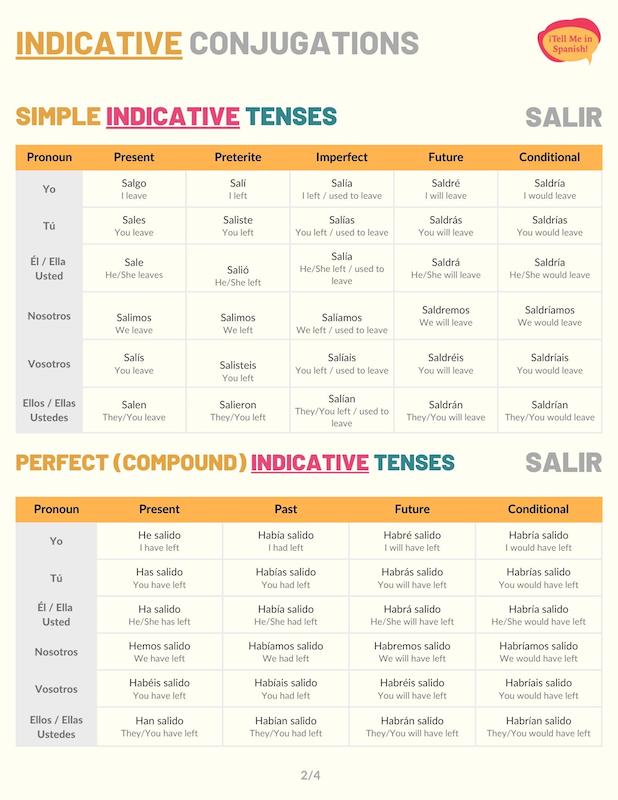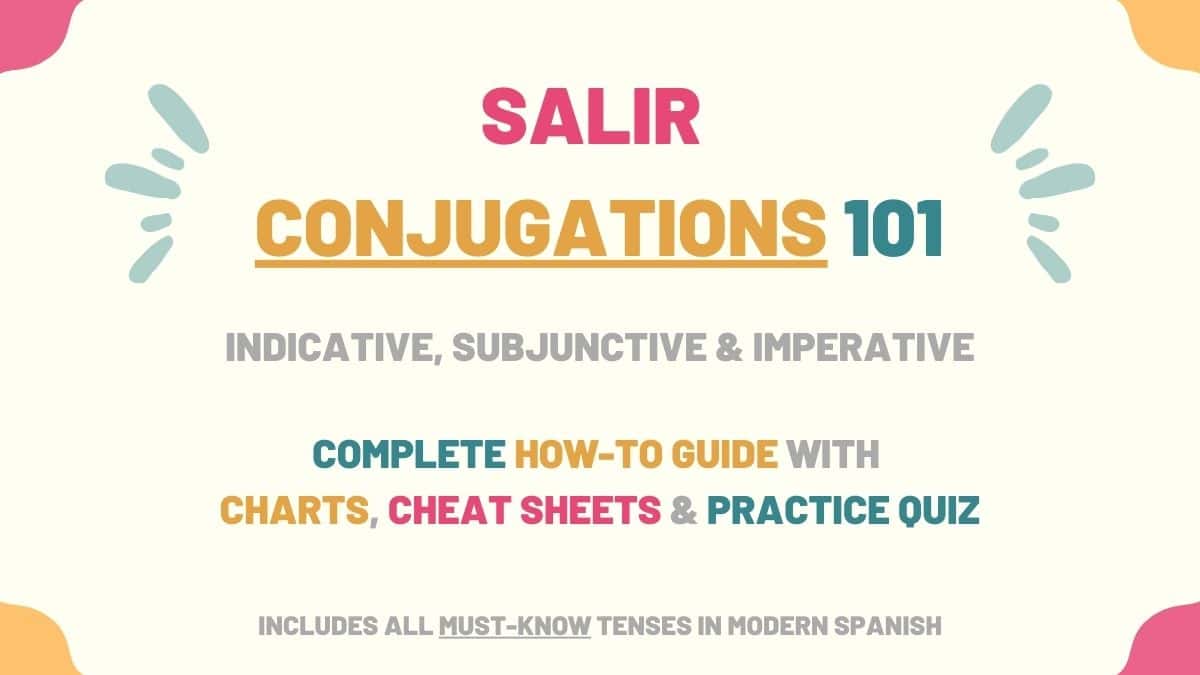‘Salir’ is one of the most common -IR verbs that you’ll use in Spanish. For that reason, this guide contains all the conjugations of salir. On top of providing you with conjugation charts, I’ve also included some examples of how to use this verb. Here is an overview of the topics you’ll learn:
- Salir Overview
- Indicative Tenses of Salir Conjugations
- Subjunctive Tenses of Salir Conjugations
- Imperative (Commands) of Salir Conjugations
- Uses & Examples
- Download Salir Conjugation Tables & Uses Cheat sheets
- Salir Conjugation Practice Quiz
Take Note: There are many tenses in Spanish. However, we don’t use them all. Many are simply old and outdated. As a result, in this guide, you’ll only learn the tenses you need to know to become fluent in Spanish.
Overview of Salir
| Verb Characteristic | Property |
|---|---|
| Verb Type | -IR |
| Irregular | Yes |
| Infinitive | Salir |
| Gerund (Present Participle) Form | Saliendo |
| Past Participle Form | Salido |
| Synonyms | Irse, marcharse, partir, surgir. |
Irregularities:
- Present: salg (only ‘yo’)
- Future & Conditional: saldr
- Present Subjunctive: salg
- Affirmative Imperative: sal / salg
- Negative Imperative: salg
Take Note: Salir is the direct translation of ‘to leave’ or ‘to get out’. However, this verb can have additional meanings depending on the sentence and context.
Indicative Conjugations of Salir
Present tense
In the present tense, salir is irregular only in the ‘yo’ form. In other words, the form yo is conjugated with the stem ‘salg-’. In this tense, salir can be used to talk about the time someone leaves a place. For example, Cindy sale a las 8.
| Person | Conjugation | Translation |
|---|---|---|
| Yo | Salgo | I leave |
| Tú | Sales | You leave |
| Él / Ella Usted | Sale | He/She leaves You (formal) leave |
| Nosotros | Salimos | We leave |
| Vosotros | Salís | You leave |
| Ellos / Ellas Ustedes | Salen | They leave You (plural) leave |
Preterite tense
The Spanish preterite expresses that you left a place or went out with someone at a specific moment in the past. For instance, el sábado salí con Mindy.
| Person | Conjugation | Translation |
|---|---|---|
| Yo | Salí | I left |
| Tú | Saliste | You left |
| Él / Ella Usted | Salió | He/She left You (formal) left |
| Nosotros | Salimos | We left |
| Vosotros | Salisteis | You left |
| Ellos / Ellas Ustedes | Salieron | They left You (plural) left |
Imperfect tense
The imperfect tense communicates the places you used to leave. For example, los domingos salíamos temprano. The imperfect form of salir can be translated as ‘used to leave’ or ‘left’.
| Person | Conjugation | Translation |
|---|---|---|
| Yo | Salía | I left I used to leave |
| Tú | Salías | You left You used to leave |
| Él / Ella Usted | Salía | He/She left He/She used to leave You (formal) left You (formal) used to leave |
| Nosotros | Salíamos | We left We used to leave |
| Vosotros | Salíais | You left You used to leave |
| Ellos / Ellas Ustedes | Salían | They left They used to leave You (plural) left You (plural) used to leave |
Near future
The near future in Spanish is used to talk about people you’re going out with or places you’ll leave in the immediate future. This tense is formed with ir (present) + a + salir and can be translated as “going to leave”.
| Person | Conjugation | Translation |
|---|---|---|
| Yo | Voy a salir | I’m going to leave |
| Tú | Vas a salir | You’re going to leave |
| Él / Ella Usted | Va a salir | He/She is going to leave You (formal) are going to leave |
| Nosotros | Vamos a salir | We’re going to leave |
| Vosotros | Vais a salir | You’re going to leave |
| Ellos / Ellas Ustedes | Van a salir | They’re going to leave You (plural) are going to leave |
Future simple tense
All the future tense forms of ‘salir’ are irregular. To conjugate this tense, you must add the future endings to the irregular stem ‘saldr-’. The simple future allows you to express that you will go out with someone or leave a place at some point in the future. For example, creo que saldremos el lunes.
| Person | Conjugation | Translation |
|---|---|---|
| Yo | Saldré | I will leave |
| Tú | Saldrás | You will leave |
| Él / Ella Usted | Saldrá | He/She will leave You (formal) will leave |
| Nosotros | Saldremos | We will leave |
| Vosotros | Saldréis | You (formal) will leave |
| Ellos / Ellas Ustedes | Saldrán | They will leave You (plural) will leave |
Conditional tense
Salir in the conditional tense is irregular. This tense is formed with the stem ‘saldr-’. The conditional of ‘salir’ conveys that someone would go out with another person or would leave a place if certain circumstances are met. For example: si fueras más amable, saldría contigo.
| Person | Conjugation | Translation |
|---|---|---|
| Yo | Saldría | I would leave |
| Tú | Saldrías | You would leave |
| Él / Ella Usted | Saldría | He/She would leave You (formal) would leave |
| Nosotros | Saldríamos | We would leave |
| Vosotros | Saldríais | You would leave |
| Ellos / Ellas Ustedes | Saldrían | They would leave You (plural) would leave |
Present perfect tense
To form the Spanish present perfect, you should use the formula haber (present) + salido. In the present perfect tense, salir is used to talk about leaving a place or going out with someone in a moment close to the present. For example, todavía no he salido de la oficina.
| Person | Conjugation | Translation |
|---|---|---|
| Yo | He salido | I have left |
| Tú | Has salido | You have left |
| Él / Ella Usted | Ha salido | He/She has left You (formal) have left |
| Nosotros | Hemos salido | We have left |
| Vosotros | Habéis salido | You have left |
| Ellos / Ellas Ustedes | Han salido | They have left You (plural) have left |
Past perfect
To conjugate to the past perfect tense, you need to use the imperfect form of haber + salido, which is the past participle form of ‘salir’. The past perfect of ‘salir’ expresses that you left or went out with someone before some other reference point in the past. Cuando llegué, Sandra todavía no había salido.
| Person | Conjugation | Translation |
|---|---|---|
| Yo | Había salido | I had left |
| Tú | Habías salido | You had left |
| Él / Ella Usted | Había salido | He/She had left You (formal) had left |
| Nosotros | Habíamos salido | We had left |
| Vosotros | Habíais salido | You had left |
| Ellos / Ellas Ustedes | Habían salido | They had left You (plural) had left |
Future perfect
Haber in future form + past participle of salir is the formula to conjugate the future perfect. With this tense, ‘salir’ communicates you will leave by or before a certain time in the future.
| Person | Conjugation | Translation |
|---|---|---|
| Yo | Habré salido | I will have left |
| Tú | Habrás salido | You will have left |
| Él / Ella Usted | Habrá salido | He/She will have left You (formal) will have left |
| Nosotros | Habremos salido | We will have left |
| Vosotros | Habréis salido | You will have left |
| Ellos / Ellas Ustedes | Habrán salido | They will have left You (plural) will have left |
Conditional perfect
‘Salir’ conjugated to the conditional perfect communicates that would have left somewhere or would have gone out with someone if a past condition was met. For example, si hubiera podido, habría salido más temprano.
| Person | Conjugation | Translation |
|---|---|---|
| Yo | Habría salido | I would have left |
| Tú | Habrías salido | You would have left |
| Él / Ella Usted | Habría salido | He/She would have left You (formal) would have left |
| Nosotros | Habríamos salido | We would have left |
| Vosotros | Habríais salido | You would have left |
| Ellos / Ellas Ustedes | Habrían salido | They would have left You (plural) would have left |
Progressive tenses
The Spanish progressive tenses describe actions in progress. The progressive forms of salir are formed with estar (conjugated) + present participle of salir (saliendo).
| Progressive Tense | Formula | Translation Example |
|---|---|---|
| Present | Estar (present) + saliendo | I am leaving |
| Preterite | Estar (preterite) + saliendo | You were leaving |
| Imperfect | Estar (imperfect) + saliendo | He was leaving |
| Future | Estar (future) + saliendo | We will be leaving |
| Conditional | Estar (conditional) + saliendo | They would be leaving |
Salir Subjunctive Conjugations
In Spanish, the subjunctive is used to talk about wishes, hypothetical situations or express uncertainty. The conjugation charts below show the subjunctive forms of salir.
Present subjunctive
In the present subjunctive, salir is a verb with consonant changes. In other words, the present subjunctive of ‘salir’ uses the irregular stem ‘salg-’ . The present subjunctive of ‘salir’ is used to talk about the expectation or possibility of someone leaving or going out with someone. For example: ojalá hoy salgas más temprano.
| Person | Conjugation | Translation |
|---|---|---|
| Yo | Salga | I leave |
| Tú | Salgas | You leave |
| Él / Ella Usted | Salgan | He/She leaves You (formal) leave |
| Nosotros | Salgamos | We leave |
| Vosotros | Salgáis | You leave |
| Ellos / Ellas Ustedes | Salgan | They leave You (plural) leave |
Present perfect subjunctive
Haber in the present subjunctive + salido is the structure you should use to build the present perfect subjunctive form of ‘salir’. The present perfect subjunctive of ‘salir’ is used to talk about wishes and probabilities. For example, espero que todo haya salido bien.
| Person | Conjugation | Translation |
|---|---|---|
| Yo | Haya salido | I have left |
| Tú | Hayas salido | You have left |
| Él / Ella Usted | Haya salido | He/She has left You (formal) have left |
| Nosotros | Hayamos salido | We have left |
| Vosotros | Hayáis salido | You have left |
| Ellos / Ellas Ustedes | Hayan salido | They have left You (plural) have left |
Imperfect subjunctive
We use the imperfect subjunctive of ‘salir’ to talk about what would happen if we left a place or went out with someone. This tense expresses wishes or hypothetical situations that are difficult to accomplish. Me gustaría que salieras conmigo.
The imperfect subjunctive has two conjugation models depending on which type of Spanish you’re using:
Latin American Spanish version
| Person | Conjugation | Translation |
|---|---|---|
| Yo | Saliera | I left |
| Tú | Salieras | You left |
| Él / Ella Usted | Saliera | He/She left You (formal) left |
| Nosotros | Saliéramos | We left |
| Ellos / Ellas Ustedes | Salieran | They left You (plural) left |
Note: The table above doesn’t include the conjugation for vosotros because this pronoun is not used in Latin American Spanish.
Castilian Spanish version
| Person | Conjugation | Translation |
|---|---|---|
| Yo | Saliese | I left |
| Tú | Salieses | You left |
| Él / Ella Usted | Saliese | He/She left You (formal) left |
| Nosotros | Saliésemos | We left |
| Vosotros | Salieseis | You left |
| Ellos / Ellas Ustedes | Saliesen | They left You (plural) left |
Past perfect subjunctive
The past perfect subjunctive of ‘salir’ is used to talk about hypothetical situations in the past. In other words, things that can no longer happen because their time has passed. For example si hubiera salido temprano…(If I had left early).
| Person | Conjugation | Translation |
|---|---|---|
| Yo | Hubiera salido | I had left |
| Tú | Hubieras salido | You had left |
| Él / Ella Usted | Hubiera salido | He/She had left You (formal) had left |
| Nosotros | Hubiéramos salido | We had left |
| Vosotros | Hubierais salido | You had left |
| Ellos / Ellas Ustedes | Hubieran salido | They had left You (plural) had left |
Salir Imperative Conjugations
The Spanish imperative is used to tell people what to do (affirmative commands) or what not to do (negative commands)
Affirmative commands
With the exception of ‘vosotros’, the affirmative commands of salir are irregular. The affirmative command of ‘tú’ is sal, ‘usted’ and ‘ustedes’ use the present subjunctive conjugations of ‘salir’. The imperative of salir can be used to ask people to leave a place. Salga de la oficina, señora.
| Person | Conjugation | Translation |
|---|---|---|
| Tú | Sal | Leave |
| Usted | Salga | Leave |
| Vosotros | Salid | Leave |
| Ustedes | Salgan | Leave |
Negative commands
Salir negative commands use the present subjunctive conjugations. This means that both formal and informal commands of salir are irregular. The negative imperative of salir is used to command people to not tell something to someone. For instance: no salgas con ella.
| Person | Conjugation | Translation |
|---|---|---|
| Tú | No salgas | Don’t leave |
| Usted | No salga | Don’t leave |
| Vosotros | No salgáis | Don’t leave |
| Ustedes | No salgan | Don’t leave |
Meanings of Salir & Examples
Now that you’ve studied the conjugation charts of ‘salir’, it’s time to learn how to use this verb. Although ‘salir’ means ‘to leave’, it has other applications:
- As a synonym of ‘to leave’ or ‘get out’
¡Sal de mi cuarto!
Get out of my room!
Ojalá saliéramos más temprano de la oficina.
I wish we left the office earlier.
- Talking about dating or going out
[‘Salir’ conjugated] + con + [person]
El sábado saldré con mis amigos.
I’ll go out with my friends on Saturday.
¿Estás saliendo con Paco?
Are you dating Paco?
- Describing outcomes and results
La operación salió bien.
The surgery went well.
- Describing the origin or source of something
El agua estaba saliendo de aquí.
The water was coming from here.
Download Salir Conjugation Tables & Uses Cheat sheets

I’ve created a PDF for you to download containing all of the conjugation tables, characteristics, and uses of salir so you can study it at your own pace!
Practice Quiz: Salir Conjugation

Practice your ‘salir’ conjugation skills by taking the verb conjugation quiz! Choose any combination of tenses and whether or not you want to practice Latin American or Castilian Spanish.



